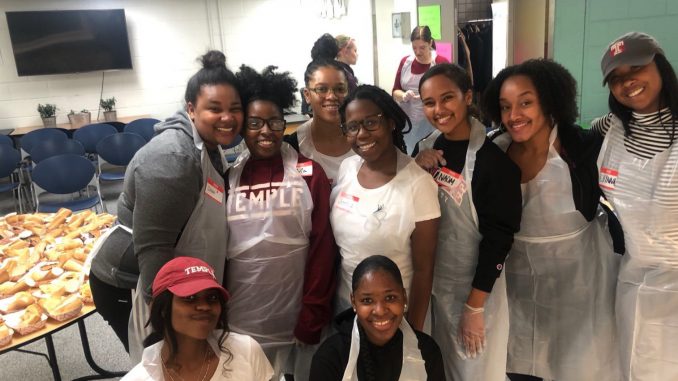
Carly Newton was one of the few Black girls in her hometown of Stroudsburg, Pennsylvania, which is majority white. When she started her freshman year of college at East Stroudsburg University, she wanted to learn more about herself, but there weren’t many ways for her to get involved in the Black community at her school.
After another student started a chapter of the National Council for Negro Women at East Stroudsburg, Newton joined and became a charter member before transferring to Temple University in her sophomore year.
“Just learning the mission of NCNW kind of, like, really aligned with, you know, where I saw myself as like a Black woman and who I was becoming,” said Newton, a senior communication studies major and president of the National Council for Negro Women at Temple. “Joining was like, you know, very like, pivotal in that journey for me.”
Black women at Temple shared how mainstream feminism is often focused on the needs of white women and doesn’t empower or liberate women of color, forcing them to create their own spaces to address their needs.
Growing up, Chynna Cummings had always been close to her sisters and when she came to Temple, she found herself longing for that same kind of sisterhood. To fill the emotional void, she created ProjectSHE.
ProjectSHE aims to support, honor and empower women, said Cummings, a 2020 journalism and criminal justice alumna. ProjectSHE has collected and donated personal care products, like soap and toothbrushes, to women experiencing homelessness in Philadelphia and hosted events to bring female students together.
“When I came up with ProjectSHE, I was just like this is going to be, like, something for everyone, like we’re gonna not only communicate with females on campus, we’re going to reach out to the community,” Cummings said.
When white women are in charge of feminist organizations, they often fail to take into account the unique struggles that women of color go through because of their intersecting identities, said Jenna Archer, a junior chemistry major and ProjectSHE secretary.
While ProjectSHE is open to all women, the 2020-2021 executive board consisted entirely of Black women, and ProjectSHE hosted events aimed at accommodating Black women, like the Annual 20 Questions: Black Love Edition Discussion, a talk about how to have healthy relationships.
“We aren’t oppressed in the same ways, you know,” Newton said. “What oppression looks like for a Black woman is not what oppression looks like for a white woman. So then when you try and come together and say that we’re fighting for the same oppression, you know, it’s almost like we can’t be.”
While white feminists often have good intentions, they are unable to take a step back to consider how race complicates sexism and in doing so, overlook racial issues, said Taylor Hargraves, a junior media studies and production major and political action chair for the Progressive NAACP at Temple.
White feminism prioritizes the voices of upper-middle-class white women and their experiences while ignoring how race and socioeconomic status can complicate sexism in addition to focusing on symbolic actions rather than concrete changes, Hargraves added.
The reason for this divide between white and Black feminists is that white women see themselves as women first and ignore their place in the racial hierarchy, said Nah Dove, an Africology and African American Studies professor.
White feminism only welcomes Black women if they are willing to be a token to speak on racial issues and make them look more inclusive than they actually are, Hargraves said.
“It’s kind of like, not fake welcoming, but welcoming to the point,” Hargraves added.
If white feminists want to be inclusive, there needs to be more communication between white feminists and women of color, Cummings said.
Being able to talk to others about difficult topics, like cultural appropriation, can help others be more aware of how their actions harm Black women, Cummings said.
White feminists should be aware that not every woman needs the same kind of liberation and what liberation looks like varies from demographic to demographic, person to person, Archer said.
The onus is on white feminists to acknowledge the historical racism Black women faced and the racism they experience today, and work to include Black women in their spaces, Newton said.
Part of the work involves deconstructing racial hierarchies by learning about how ideas about race and racial superiority were formed and taking responsibility for continuing to uphold those ideas, Dove said.
“It is critical to feminism,” she said. “If one cannot theoretically understand how feminism developed in this way then, you know, what’s one doing but maintaining these hierarchies.”


Be the first to comment